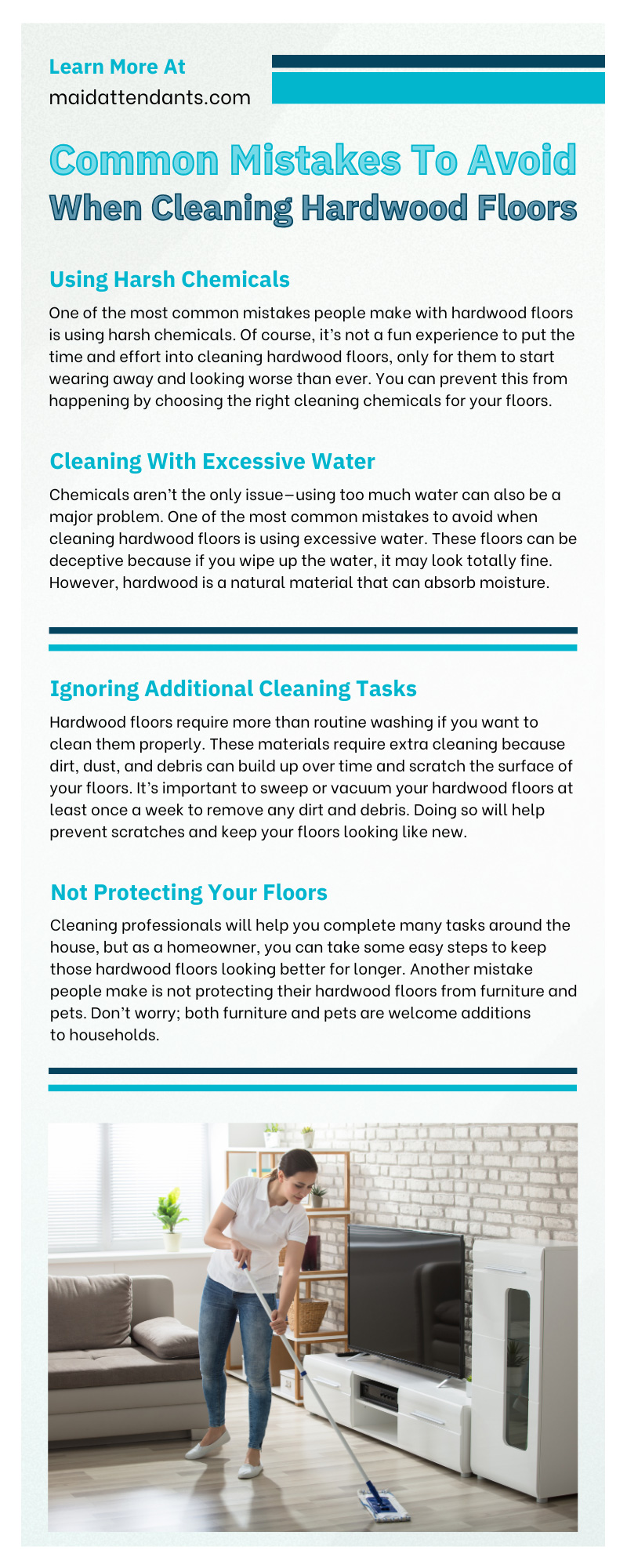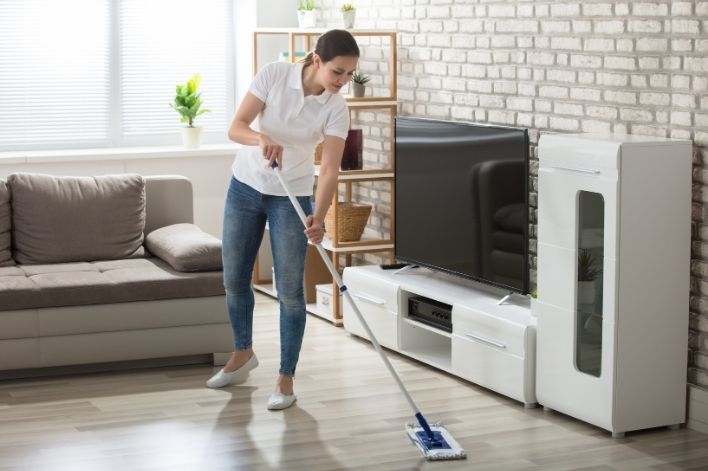Hardwood floors are a popular choice for many homeowners due to their durability and aesthetic appeal. Every flooring material has pros and cons, but learning these factors will help you protect each option wonderfully. As stunning as they look, cleaning hardwood floors can be tricky if you don’t know what you’re doing.
Many make mistakes when it comes to cleaning their hardwood floors, which can lead to damage and costly repairs. We can teach you how to take care of your lovely hardwood floors so they will remain a stunning feature of your house for longer. Let’s examine the common mistakes to avoid when cleaning hardwood floors so you can give them the care they need.
Using Harsh Chemicals
One of the most common mistakes people make with hardwood floors is using harsh chemicals. Of course, it’s not a fun experience to put the time and effort into cleaning hardwood floors, only for them to start wearing away and looking worse than ever. You can prevent this from happening by choosing the right cleaning chemicals for your floors. That said, what works for each material will vary, so it’s not always easy at first to determine the perfect solutions. Harsh chemicals you should avoid using on wood include ammonia and vinegar. Cleaning chemicals containing those materials can strip away the protective finish of your hardwood floors.
This stripping makes them susceptible to scratches, stains, and discoloration. Instead, opt for gentle, pH-neutral cleaners specifically designed for hardwood floors. These will effectively clean your floors without damaging them. Using the wrong tools when cleaning hardwood floors can also cause damage. Avoid using harsh scrub brushes, steel wool, or abrasive cleaners as these can scratch and dull the surface of your floors.
Cleaning With Excessive Water
Chemicals aren’t the only issue—using too much water can also be a major problem. One of the most common mistakes to avoid when cleaning hardwood floors is using excessive water. These floors can be deceptive because if you wipe up the water, it may look totally fine. However, hardwood is a natural material that can absorb moisture. The more water a wood floor soaks up, the more damage will occur over time. Excessive water can cause it to warp and swell.
Be Mindful of Mops
It’s important to use a damp cloth when cleaning hardwood floors and immediately wipe up any excess water. Typically, a mop is a very helpful tool for washing floors, but not with hardwood. Avoid using wet mops because they can also cause damage to your floors. The more you mop, the easier it is to wear down the wood surface. Simply put, be mindful of how much water you use on hardwood floors, and it will be a great tool for routine washing.
Ignoring Additional Cleaning Tasks
Hardwood floors require more than routine washing if you want to clean them properly. These materials require extra cleaning because dirt, dust, and debris can build up over time and scratch the surface of your floors. It’s important to sweep or vacuum your hardwood floors at least once a week to remove any dirt and debris. Doing so will help prevent scratches and keep your floors looking like new.
As a result, you should always work with a cleaning team with a versatile range of techniques so they can use the right option for every material in your household. For example, Maidattendants, our Nashville cleaning service uses a wide range of techniques when it comes to cleaning floors, including sweeping, mopping, and vacuuming. Mopping may not be the right fit for hardwood, but less absorbent materials will be less disruptive after a good wipe-down with a mop.
Not Protecting Your Floors
Cleaning professionals will help you complete many tasks around the house, but as a homeowner, you can take some easy steps to keep those hardwood floors looking better for longer. Another mistake people make is not protecting their hardwood floors from furniture and pets. Don’t worry; both furniture and pets are welcome additions to households. That said, having hardwood floors does pose some challenges.
Furniture legs can scratch and dent your floors if you often move them around. For example, accidentally bumping into a sofa or shoving it to make way for new furniture drags the legs across the floor. It’s important to use protective pads under the legs or feet so you can prevent your favorite table, sofa, or chair from carving up your wood flooring. Your pet’s nails can also cause damage to wood flooring over time. An easy solution is to keep your pet’s nails trimmed.
Handling Heels
Another item that can cause significant damage is a pair of high heels. The small, pointy heels can exert a large amount of pressure on a tiny area of your floor, leading to dents. Hardwood flooring has a sleek and beautiful surface, so dents scattering across it will compromise that aesthetic.
Try implementing a no-shoes policy in rooms with hardwood floors and provide shoe racks or designated shoe areas near the entrances of your home. Kindly remind your guests of your no-shoes policy to keep your floors in pristine condition when they come over. Having mats at the entrance is a convenient way to ensure no one scratches up your floor upon entering your home.
Long-Term Care
Taking care of hardwood floors requires proper cleaning techniques and maintenance. These floors may seem high maintenance, but the care you give them will translate into comfortable, stunning flooring for your home. Avoiding the common mistakes made with hardwood floors can help you keep your home looking beautiful for years to come. Remember to use gentle cleaners, avoid excessive water, regularly sweep or vacuum, and protect your floors.
With these tips in mind, you can enjoy your hardwood floors without worrying about damaging them. Although hardwood floors require ample maintenance, you can find experts who will help you keep those materials in excellent shape. Don’t hesitate to work with local cleaning experts who have the knowledge, skill, and cleaning materials to keep hardwood floors intact and visually appealing.




